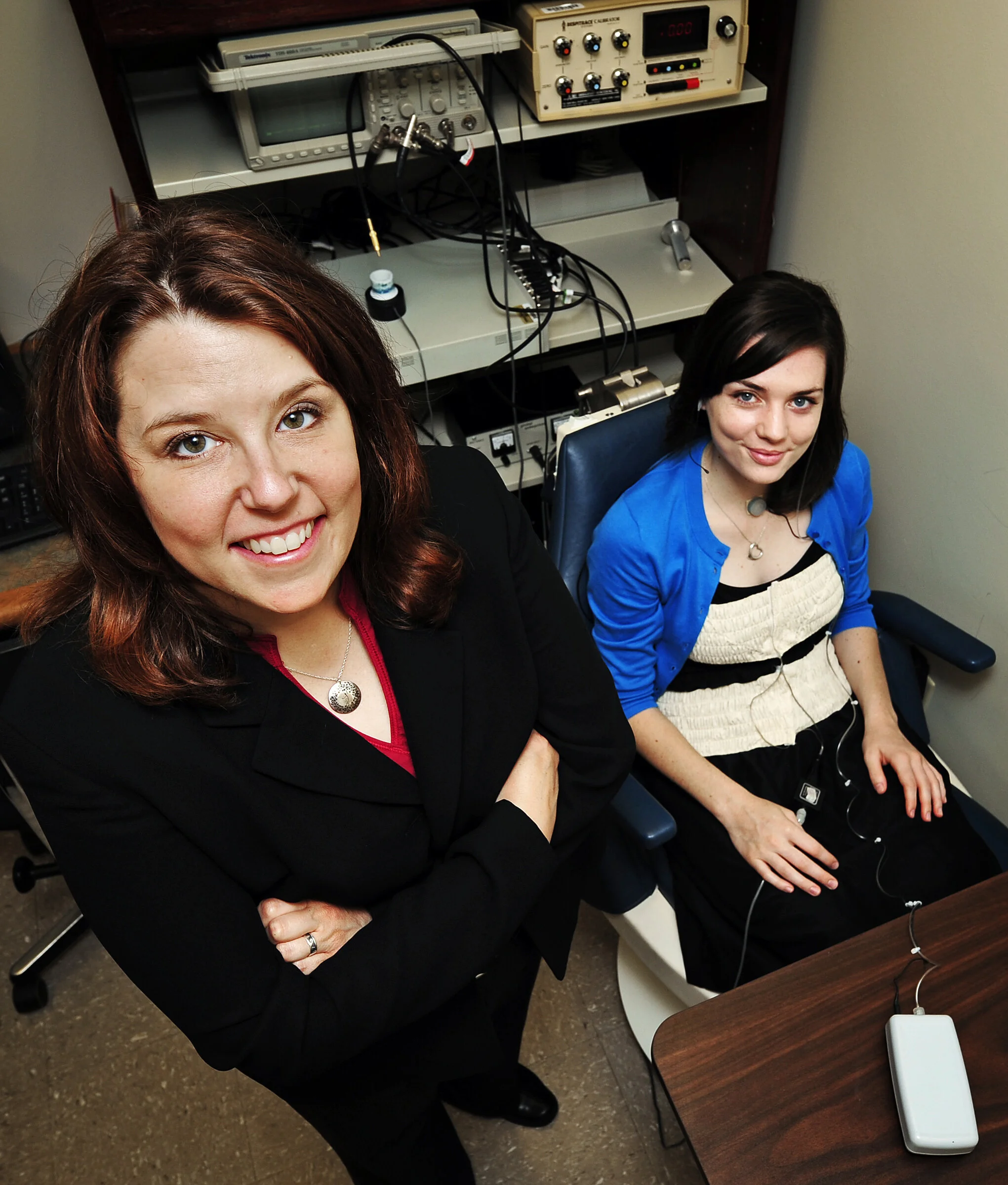Episode 49: Assessing and Treating Respiratory Function in Motor Speech Disorders with Jessica E. Huber, PhD, CCC-SLP
Respiratory impairments impact intelligibility in people with motor speech disorders. However, assessing and treating people with these disorders can be difficult. We will describe some clinically-relevant measurements of respiratory function in speech that can be completed without expensive equipment. We will discuss how to address respiratory impairments in people with motor speech disorders.
topics covered:
Relevance of assessing respiration during motor speech evaluations
Low tech methods of assessing respiration
Respiration treatment methods in motor speech disorders
Resources mentioned in the episode:
Dr. Huber (left) in her lab
Visit Dr. Huber’s Lab! The Motor Speech Laboratory at Purdue University
what does the research say? find out:
Impact of Typical Aging and Parkinson’s Disease on the Relationship Among Breath Pausing, Syntax, and Punctuation (has the paragraph Jessica described along with norms for where people breathe relative to syntax)
The Impact of Expiratory Muscle Strength Training on Speech Breathing in Individuals With Parkinson's Disease: A Preliminary Study (use of expiratory muscle strengthening to improve speech and respiration in PD)
Filled Pauses as a Special Case of Automatic Speech Behaviors and the Effect of Parkinson's Disease (interesting paper on filled and silent pauses in PD)
Physical Examination of the Rib Cage Wall by the Speech-Language Pathologist (assessment of the rib cage)
A Clinical Method for the Detection and Quantification of Quick Respiratory Hyperkinesia (assessment of respiratory hyperkinesia)
Physical Examination of the Abdominal Wall by the Speech-Language Pathologist (assessment of the abdomen)
Physical Examination of the Diaphragm by the Speech-Language Pathologist (assessment of the diaphragm)
Speech Breathing in Individuals with Cervical Spinal Cord Injury (paper describing respiratory patterns post-spinal cord injury)
Improving Speech in Clients Who Use Invasive Ventilation (ventilator setting adjustments to improve speech breathing and speech production)
Effect of Cues to Increase Sound Pressure Level on Respiratory Kinematic Patterns During Connected Speech (has sound pressure level - SPL - and utterance length norms for young adults
Effect of Parkinson’s Disease on the Production of Structured and Unstructured Speaking Tasks: Respiratory Physiologic and Linguistic Considerations & Effects of utterance length and vocal loudness on speech breathing in older adults (has SPL utterance length norms for older adults)
Speech Breathing in Women (utterance length norms for young, middle-aged, and older adult women)
Age and Speech Breathing (utterance length norms for young, middle-aged, and older adult men)
Effects of Abdominal Trussing on Breathing and Speech in Men With Cervical Spinal Cord Injury (using an abdominal binder in people with lower spinal cord injury)
Longitudinal Changes in Speech Breathing in Older Adults with and without Parkinson's Disease. (paper on longitudinal changes to speech breathing in PD)
HUGE thanks to Dr. Jessica Huber for providing the links to all this great research with helpful norms! Mahalo!
*hitting a paywall? Can’t access the research? Try Google Scholar. If that doesn’t work, then Dr. Huber welcomes inquires about all things SLP and requests to papers she has published via email: jhuber@purdue.edu.
Jessica E. Huber, Ph.D., CCC-SLP, is a Professor of Speech, Language, and Hearing Sciences and Associate Dean for Research in the College of Health and Human Sciences at Purdue University. The aim of her National Institutes of Health funded research program is to develop a theoretical account of the multiple factors that influence speech production and cognitive change in older adults with and without Parkinson’s disease (PD) and to translate findings to clinical treatment resulting in improvements in communication. She is the inventor of a small wearable device, the SpeechVive device, to treat communication impairments in people with PD. The device elicits the Lombard effect that can be exploited to improve speech clarity in individuals with PD while bypassing cognitive and sensory impairments. Her current research continues to examine the physiologic (respiratory, laryngeal, and supralaryngeal) effects of a number of speech therapy techniques including respiratory muscle strength training and using the SpeechVive device.
SUBSCRIBE & REVIEW
Have you subscribed to the podcast? Subscribe today on Apple Podcasts/iTunes and future episodes will magically arrive on your doorstep/iPhone. For Android users, check out the 10 options available to you to listen!
You’ll earn my undying gratitude by leaving a review on iTunes! Reviews help other SLPs find the podcast. Also, I love reading your feedback! Just click here to review, select “Ratings and Reviews” and “Write a Review,” and let me know what your favorite part of the podcast is. Malaho plenty!

